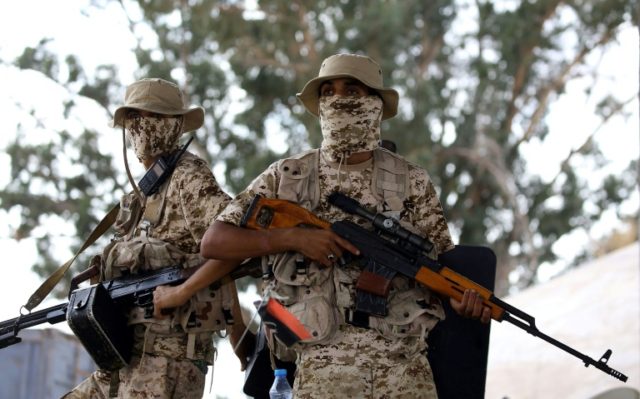U.S. President Donald Trump’s administration pledged $500,000 in “rapid response non-lethal aid” to the United Nations-brokered Government of National Accord (GNA) in chaos-ridden Libya soon after the breakaway administration consolidated its control of two-thirds of the North African nation.
The funding, which complements the $30 million in ongoing security aid to the GNA, is intended to “bolster security and address current threats,” the U.S. Embassy in Libya declared in a press release issued Tuesday, citing deadly political rivalries between forces loyal to the internationally recognized government and warlord Gen. Khalifa Haftar’s Libyan National Army (LNA) as well as the ongoing menace posed by jihadi groups like the Islamic State (ISIS/ISIL).
U.S. Embassy officials explained in a press release issued Tuesday:
The United States pledged $500,000 USD in rapid-response non-lethal assistance in support of Ministry of Interior efforts to strengthen the capacity of the [GNA’s] Tripoli Security Directorate [forces].
This new assistance complements the United States’ $30 million USD in ongoing security assistance in support of Government of National Accord priorities, including projects to provide training to the Tripoli Security Directorate, help implement international standards at key airports, improve Libya’s border security management capability, clear unexploded ordinance in Sirte, bolster security sector reform, and build coordination between relevant actors ahead of elections.
The American embassy’s announcement came as Gen. Thomas Waldhauser, the top U.S. commander in Africa, and American Amb. Peter Bodde traveled to Tripoli on Tuesday to meet with senior GNA officials including PM Sarraj.
“We reiterated United States support for Libya as a unified, secure, and prosperous state under a government that can serve the Libyan people,” the American Embassy noted, later adding, “We will not tolerate spoilers to the political process.”
Additional U.S. aid for Libya came at a critical point in the conflict that has been plaguing the North African country since the NATO-backed removal of dictator Muammar Gaddafi in 2011.
The U.S.-backed ouster of the dictator plunged Libya into political and security mayhem that has allowed jihadi groups like the Islamic State (ISIS/ISIL) and al-Qaeda to entrench themselves while rival militias loyal to Haftar and the GNA compete for power and influence in the country. Both Haftar and the GNA have fought against the jihadi forces in Libya.
Propped up by Russia, France, the United Arab Emirates (UAE), and neighboring Egyp, strongman Gen. Haftar, the head of the Tobruk-based breakaway government’s LNA, strengthened his hands and further undermined the U.S.-backed GNA by seizing more territory in southern Libya, including some that once belonged to the U.N.-backed administration led by Prime Minister Fayez al-Sarraj.
The strongman general’s recent push into southwestern Libya left the warlord in control of two-thirds of the country, including most border crossings and the majority of onshore oil fields.
Haftar is the top rival of the internationally recognized Serraj administration based in Tripoli, which does not have any official forces of its own. The prospect of the Haftar moving in on Tripoli has triggered concerns of an all-out war between the two sides.
Citing unnamed diplomats, Reuters noted, “Haftar has not said whether he wants to march on Tripoli. But he has left some troops from the southern campaign in central Libya to build up pressure on Serraj to agree on a power-sharing deal which would make him official army commander.”
Russian-backed Haftar is now reportedly seeking to seize the coastal city of Sirte, located just a few hundred miles from the shores NATO’s southern flank.
Although the U.S.-led coalition and local forces have downgraded the so-called caliphate in Iraq and Syria to a hamlet of tents, ISIS remains a threat in and beyond the Middle East, including Libya where the group is reportedly trying to regroup.
The U.S. Embassy noted:
We thanked Prime Minister al-Sarraj and Minister [of Interior Fathi] Bashaga for Libya’s strong partnership in combating ISIS and other UN-designated terrorist groups, and stressed the importance of avoiding further conflict that would enable terrorism and increase social and economic hardships.
Soon after taking office, President Trump declared that his administration’s involvement in stabilizing Libya would be limited to combating ISIS.
Under Trump, the United States military has sporadically targeted Islamic terrorists in Libya with airstrikes.
Gen. Waldhauser and independent experts have expressed concerns that Russia’s support for the warlord Haftar could undermine U.S. interests in the North African nation.
At the end of February, Haftar and Serraj agreed to hold democratic elections by the end of 2019.
“The only lasting solution for Libya is to overcome its political impasse,” the U.S. Embassy noted, expressing support for the U.N.’s efforts to bring both sides to the negotiating table.
Last year, Haftar and Serraj failed to keep their pledge to hold elections by December 2018.
“A major military push south by the Libyan strongman Marshal Khalifa Haftar has left him in the ascendant, and possibly able with international backing to dictate the terms of a future Libyan political settlement, including presidential and parliamentary elections,” the Guardian reported on March 11.

COMMENTS
Please let us know if you're having issues with commenting.